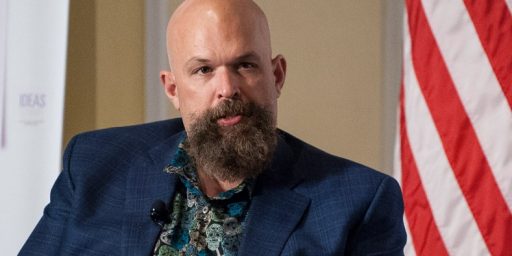Washington’s Egghead Quotient Keeps Growing
Anne Kornblum has an interesting piece in the New York Times magazine about the intellectual migration toward Washington, D.C.
Washington’s Egghead Quotient Keeps Growing
IRVING KRISTOL snubbed New York when he left for Washington in 1988, pronouncing Manhattan no longer the “nation’s intellectual center” as he packed off his ideological enterprise. The Atlantic Monthly does not have as lofty a motive for moving to Washington in the months ahead. David Bradley, the owner of the venerable magazine, said the recent decision to move and consolidate his publishing enterprises in Washington was driven by economics, not symbolism or a desire for cachet. But the news has given some readers, writers and thinkers – not to mention Bostonians – a familiar pang of anxiety, a reminder that even in the democratic Internet age, all cultural capitals are not created equal.
[…]
Boston’s inferiority complex aside, the attention paid to The Atlantic’s move – and to news that the celebrity-publisher Judith Regan plans to set up shop in Los Angeles rather than in New York – suggests that there is a stronger bond between cities and their intellectual elites than one might expect in an era of BlackBerry pagers and online magazines. However far the geographic divides have been bridged, certain places are doing better than others. The interplay between personal contact and ideas still matters, at least somewhat.
And while three East Coast cities have jockeyed for prominence, a perceptible southward tilt is continuing, as Boston has evolved from its liberal arts and political origins, and Washington has, in a sense, matured. Intellectuals still reside in Boston, New York and Washington (and hop the shuttle easily among the three), but in a highly charged political environment, there has been a move away from academic ideas toward ones generated in the real world, or at least real government. And if not that, then in think tanks. “It’s partly what grows up around a government over time,” said Jacob Weisberg, the editor in chief of the online magazine Slate, which moved its headquarters from Seattle to New York this year after Microsoft sold it to the Washington Post Company. Slate also maintains a sizable Washington office.
[…]
Washington has become the beneficiary of a gradual intellectual migration. As industry-financed think tanks grow and finance a culture of policy analysts and serious thinkers with ideological differences, more intellectuals have been drawn to a city previously considered a backwater of shallow politicians and colorless government bureaucrats.
The think tank angle is an important aspect of the story, I think. Previously, the intellectual center of American life was the university. While we have great universities everywhere, Boston has a heavy concentration of them. As the university research model has turned to hyper-specialization, though, with academics mostly writing for other academics in arcane language that only they understand, the influence of the university in shaping great ideas has waned. Public intellectuals, whether media pundits or think tank denizens, write for a much broader audience and are therefore more influential.
For background, see Atlantic Monthly Moving to D.C.






“with academics mostly writing for other academics in arcane language that only they understand, the influence of the university in shaping great ideas has waned.†Or, it could be that the limitations of meeting PC requirements and limiting publication to liberal-approved ideas has stultified university thought.